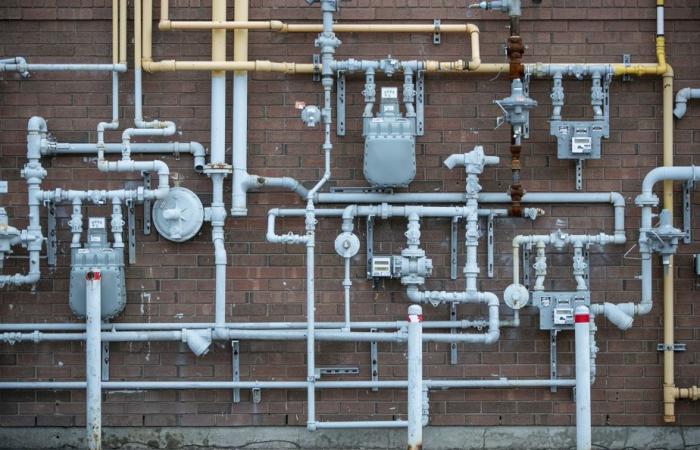The Legault government is preparing to ban the use of natural gas of fossil origin for heating in residential, commercial and institutional buildings by 2040. Only the industrial sector will still be able to use it.
Published at 5:00 a.m.
Residences, businesses and institutions that want to continue using gas will therefore have to use gas from renewable sources (GSR), such as that manufactured by the biomethanization of organic materials, Quebec will announce this Monday.
The regulations that the government is preparing target not only new buildings, but also existing buildings, in order to accelerate the decarbonization of Quebec’s real estate stock.
However, a different schedule and rate will apply in Outaouais, due to the “specificities of the energy ecosystem” of this region, indicates the government.
Gazifere, the natural gas distributor in the region, will have to submit a decarbonization plan in January 2025 for the entire building sector with a view to implementation in January 2026.
Quebec will also prohibit from 2026 the installation of gas heating appliances in new residential constructions of less than 600 square meters of three floors or less, except in Outaouais.
Support for municipalities
The future Quebec regulations are openly inspired by municipal regulations already in force in certain municipalities in Quebec, such as Montreal, Prévost, Mont-Saint-Hilaire and Candiac.
The Legault government, whose Bill 41 on the environmental performance of buildings tabled in the fall of 2023 raised fears of a setback because it wanted to prevent cities from acting unilaterally, maintains that its regulations make it possible to offer “a vision global” for the decarbonization of the entire building sector.
The law, which has since been adopted, finally allows municipalities to adopt more ambitious measures than those of the government, but these municipal regulations will have to be approved by the minister responsible for the Environment, which represents “new pitfalls” for the decarbonization initiatives, according to the Quebec Environmental Law Center.
In order to limit the increase in demand for electricity that the ban on fossil gas could cause, Quebec intends to double annual energy savings by 2030, in particular by financing energy efficiency measures.
Dual-energy systems combining electricity and gas will also be used to reduce electricity consumption during winter peaks.
Partial reduction
The reduction in fossil gas burned in Quebec, mainly extracted by hydraulic fracturing in Western Canada, will however only be partial, since 60% of the gas distributed by Énergir is intended for the industrial sector, which will be able to continue to use gas. fossil.
The use of gas of fossil origin will also remain permitted for “processes”, such as laundries, industrial kitchens and temporary heating of buildings under construction.
Énergir therefore considers it realistic to be able to supply the residential, commercial and institutional sectors 100% with GSR by 2040, even if it currently only represents 2% of the volume of gas it distributes.
This was also an objective that the distributor had given itself, declared to The Press its executive vice-president for Quebec, Stéphanie Trudeau, who welcomes the government’s intentions.
“This is very, very good news. [qui] gives us free rein,” she said, rejoicing that the Quebec government recognizes GSR as a “valid” energy source.
Énergir is also satisfied that the regulations are uniform, he who wanted to avoid “a patchwork” of different municipal regulations and who had also filed a lawsuit against the City of Prévost to invalidate the ban on the connection of certain gas appliances .
The distributor is also disappointed that Quebec wants to ban connections in new residential buildings, emphasizing that they are now all supplied with GSR.
“Orderly” transition
The measures envisaged by Quebec will allow “an orderly transition to renewable energies, while ensuring progressive adaptation for consumers,” declared the Minister of the Environment, the Fight against Climate Change, Wildlife and Parks, Benoit Charette, from Baku, Azerbaijan, where he is attending the 29e United Nations Climate Change Conference (COP29).
To facilitate the electrification of building heating and energy saving, Hydro-Québec intends to help its customers acquire “efficient technologies”, such as heat pumps.
“It is fundamental that electrification is carried out efficiently,” he told The Press Cendrix Bouchard, spokesperson for Hydro-Québec.
After having banned fuel oil, then gas of fossil origin, Quebec is now beginning to reflect on propane gas, a by-product of crude oil refining or natural gas extraction operations, which is the last hydrocarbon of which the Abolition is not yet planned in the province.






